Peter MALONE
Saturday, 18 September 2021 19:44
Terrible Joe Moran
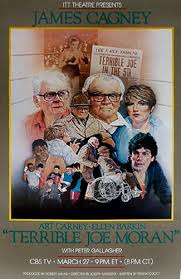
TERRIBLE JOE MORAN
US, 1984, 100 minutes, Colour.
James Cagney, Art Carney, Ellen Barkin, Peter Gallagher, Lawrence Tierney.
Directed by Joseph Sargent.
Terrible Joe Moran is an entertaining telemovie, perhaps not quite as good as was intended. It tells of an old man, a former boxing star who, on his 80th birthday receives a press and television tribute. He is in a wheelchair, looked after by a devoted friend, he has cut himself off from his family - especially his socialite wife. His granddaughter has problems with her boyfriend who is being pursued by the Mafia for several thousands of dollars. She detests her grandfather but goes to see him - there is a misunderstanding after the mellowing between the two and she promises to write his biography. Ultimately they realise they need each other and there is a reconciliation. Familiar material.
What makes it different is that James Cagney portrays the old man. Cagney, after a successful career in the '30s, '40s and '50s, made his last feature film One, Two, Three in 1961. He refused to be coaxed out of retirement until 1982 when he appeared in Ragtime. This is his debut on television. While in a wheelchair, he is nevertheless his old aggressive self - enhanced by clips on television taken from one of his '30s movies where he appeared as a boxer. The supporting cast is good - Art Carney as his devoted friend and Ellen Barkin (Diner, Harry and Son, Buckaroo Bonzai, Tender Mercies) is the granddaughter. Peter Gallagher (Idolmaker, Summer Lovers) is the boyfriend. The film is fairly sentimental and relies on emotional impact overly much - which detracts from its ultimate impact. Direction is by Joseph Sargeant, director of many films and telemovies.
1. An interesting and enjoyable film? Portrait of Joe Moran and his granddaughter? A picture of old age, the generation gaps, the reconciliation between the generations?
2. New York locations, apartments, the streets, gangsters? Authentic city, atmosphere? The insertion of the old clips of James Cagney starring as a boxer? The impact of the aged Cagney watching himself in his heyday? Musical score and feeling?
3. The title and its being a nickname for Joe in his heyday? His career as a boxer, his success, his not taking a fall, his honesty, the memories of his fights, the support of the crowd, the support of the fashionable young woman and his quick courtship and marriage? His leaving her? Separation from his family and its effect on him? His lack of knowledge about his family? The importance of his independence, but his being in the wheelchair? Mobility and immobility? His reliance on Troy? The comedy - Odd Couple style? Meals, cleaning the house, moving him round? The encounter with his granddaughter, suspicions? his being attracted towards her, talking with her, sharing reminiscences, the beginnings of the biography? His discovery of the truth about Nick? His disappointment? his going to the Mafia boss - and the discovery of rigged fights in the past? His strong stance? Giving the money? His refusal to see his father, his physical and optional decline? Cantankerous with Troy? The final reconcilia in a moving and sentimental ending? James Cagney's peppery styled being in the wheelchair?
4. Ronnie and her love for Nick, the dangers, their having to move, her resentment of her grandfather, love for her mother and grandmother? The decision to go to her grandfather? The clash, her suspicions, her aggressiveness? Staying, hoping for the money, going,to rob the safe, being caught by Troy? her mellowing, sharing reminiscences? admiration, calling him Poppa? The beginnings of the biography, her discovering herself as a writer? The phone calls from the Mafia? Joe's discovery of the truth; giving the money but cutting her off? The relationship with Nick, his schemes and dreams, her concern about the violence and his being bashed, meeting him, on the run? Her return to her grandfather, not being allowed in for the final reconciliation?
5. Art Carney as Troy and the odd Couple? Icon Running the house, looking after Joe, attacking him, his quips? Protecting him from Ronnie? Discovering her at the safe, refusing to let her in, relenting?.
6. Nick and his brainwaves, the need money, borrowing, on the run, love for Ronnie, the desperate meetings, the bashings, pressure on Ronnie to ask her grandfather for the money final dreams? The nostalgia for the '30s, the boxing era, the straight fights, the rigged fights? The tributes from the boxing fraternity? The television programme?
7. The Background of New York gangsters, the Mafia, their controls? The ageing Mafia boss and his acquaintance with Joe, the two old men, the boss riddled with cancer, Joe standing up to him?
9. A portrait-of old age, needs, affection, loneliness, past wilfulness catching up? The possibilities of happiness in old age through reconciliations, especially in families?
Published in Movie Reviews
Published in
Movie Reviews
Tagged under
Saturday, 18 September 2021 19:44
Taffin
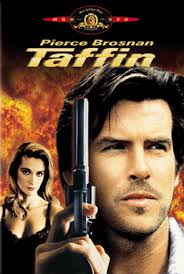
TAFFIN
UK, 1988, 96 minutes, Colour.
Pierce Brosnan, Ray Mc Annally, Allison Doody, Patrick Bergin, Gerald Mc Sorley.
Directed by Francis Megahy.
Taffin is a tough guy Irish thriller - with a surprising enviromental background. Pierce Brosnan is an ex-seminarian who is skilled at stand over tactics to get people to pay their bills. He gradually becomes involved in protests against the building of a chemical factory in his coastal - Irish town. Brosnan seems to be a touch humourless and severe in his tough luvvy-darling role.
However, there is quite a good supporting led by Ray Mc Anally as one of his former professors who is protesting against the factory. There are some scenes of tough action thriller style, some protests and arguments about envitonment, some violence, Irish style - with echoes of IRA terrorism. The Irish setting is unusual - and the town attractive. However, the behaviour, of course, could be from anywhere.
1. Interesting action thriller? Irish setting? Environmental issues?
2. The Irish locations, the town and tis enviornment? Action sequences and editing? Musical score?
2. The title, the focus on Taffin - the tough guv hero?
3. Taffin in action at the opening of the film, people asking him to help, his tough tactics, using his wits as well as his brawn? Getting money paid up? His relationship with his mother and her kindness? His own area, his books and desk? His relationship with his brother and sister-in-law? His reputation in the town? His friendship with O'Rourke, the explanation of his background in the seminary, urging him to go out and confront the world? The encounter with Charlotte, going home with her, living with her, his rough attitudes, her walking out, his brother persuading him to apologise? The resumption of the relationship? Involvement in the chemical factory plan, the discussions with the councillor, photographing with the owner, threatening him with the photos? Exercising his charm with the Councillor's wife? His friends and their shrewdness, using the cordless telephone, etc? Coming up on his victims quietly? Persuasiveness?
4. The thugs from the developers and their bashing him? The attack on Charlotte? The attack on O'Rourke? The reprisals and the burning down of the notice? The warfare in the town? His threatening Martin? The burning of Martin's home and his death? The townspeople turning their back on him? Charlotte and her confronting and bringing him her? His shrewdness in surviving, confronting the thug, the final shootouts? The confrontation with Sprawley and his death? Leaving for more adventures with Charlotte? The convention of the strongarm tough guy film, Pierce Brosnan's interpretation of it?
5. Charlotte, her work, her story, with Taffin, trying to get his story? Friendship,
clashes? The fight, her leaving, his apology? Her continued support, confronting the
townspeople?
6. The family, the mother, his brother? The assault on his brother? Taffin fighting to defend the family?
7. Rourke, his age, teaching in the seminary, retired, protests? The violent threats, the abuse? Supporting Taffin, turning away from him?
8. The range of people in the town: at the bars, at the striptease club, the protesters, Taffin's friends and alies? The owner of the field and his shot gun? The councillors and their corruption, the meetings?
9. Sprawley and Martin, their deals, corruption? The meetings and the plan, the building? Sprawley and his getting Martin killed, his thugs, the confrontation with Taffin and his defeat?
10. The familiar conventions of the tough guy thriller, the champion of the helpless? Themes and the environmental themes and the environmental speeches?
Published in Movie Reviews
Published in
Movie Reviews
Tagged under
Saturday, 18 September 2021 19:44
Talent for Murder, A
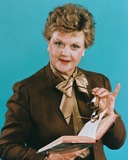
A TALENT FOR MURDER
UK, 1984, 80 minutes, Colour.
Angela Lansbury, Laurence Olivier, Hildegard Neil.
Directed by Alvin Rakoff.
A Talent for Murder is a BBC telemovie based on a Broadway play. It has a single room, set in large drawing room where Anne, an author of murder mysteries confined to a wheelchair, holds state and has an extraordinary computerised security set-up (where she tests some of her theories for incidents in the novels). She is the target of an attempt at murder by greedy relations. The film is a tour de force for Angela Lansbury (before Murder She Wrote) as an over the top authoress. Lansbury gives it her full strength (drawing on many of the mothers she played, most especially the extraordinary mother of Laurence Harvey in The Manchurian Candidate). She is well matched with Laurence Olivier as her personal friend and doctor. He gives a more self-effacing performance than that of Angela Lansbury - but compliments her with his British verbal precision and wit. The supporting cast is led by Hildergarde Neil. It is highly contrived - but relies on the whim of the dialogue, the set-up of the murders - the clues and, of course, the resolution.
1. Entertaining murder mystery - the American style compared with that of Agatha Christi?
2. The mansion, the room and the single set? Room to move, Anne in her wheelchair? The-security set-up? The art work in the room? An appropriate set for this kind of murder mystery and solution?
3. The title, its reference to Anne, to Doc?
4. Angdla Lansbury as Anne: screen presence, larger than life, extraverted woman, a woman of whims? Her wit, demanding attention from everyone? Her novels and success, quoting their sales? Knowledge of her plots, testing out devises? Her memories of Bill and devotion to her dead husband? Looking after Pamela after the accident and her concern for her? Her long friendship with Doc an easy to, and fork with him? Thinking her son weak, despising her daughter-in-law? Despising Mark? Her work with Rashi, his Indian background, prison, his working with her - and the initial seeming death? As the night wore on, her picking on people, her drinking and smoking, witty remarks, memories of Matise and Picasso? How much to be believed? The confrontation with Sheila, the cassette, the setting of the trap? The aftermath, tricking the murderer at the television set? Her exposing Mark? Her story to Doc and getting him to admit the truth? The happy ending?
5. Doc, Laurence Olivier style, verbal delivery? Friendship, the many years with Anne, coming from Paris? Jealousy of the family? His interactions with all the family, his pampering Anne? The threats by Sheila? His suggestions for Anne and giving away her art, moving house etc? The theatre, the death, the climax with the exposure of Mark? Anne and her explanation of how Doc killed Sheila? their friendship continuing?
6. Sheila and Laurence, Laurence and his debts, relationship with his mother? Sheila and her greed, collaboration with Mark? Wanting to put Anne away? Anne's gifts, pinning the microphones, making the tapes? The confrontation with Sheila? Her death? Confrontation with Laurance, his criticisms of his mother, her affirmation of some character in him?
7. Mark and Pamela, the accident, Mark and his double dealing with Sheila, abandoning Pamela? The plot, taped? His attempt to murder Anne?
8. Rashi, his prison background, collaborating with Anne, the computer set-up? His Indian proverbs? Helping out Anne the confrontation with the characters, in the wheelchair? Devoted servant?
9. An American drawingroom murder mystery in the Agatha Christie tradition?
Published in Movie Reviews
Published in
Movie Reviews
Tagged under
Saturday, 18 September 2021 19:44
Tall Men, The
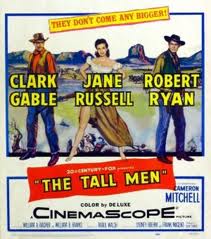
THE TALL MEN
US, 1955, 122 minutes, Colour.
Clark Gable, Jane Russel, Cameron Mitchell, Robert Ryan.
Directed by Raoul Walsh.
The Tall Men is a big, lavish western. It was one of the first made in Cinemascope. This is evident in the use of wide screen techniques, the Montana and Texas locations, the long sequences of the cattle drive in all its detail. The film was written by veterans Sydney Boehm and Frank Nugent. However, the film is an uneasy blend of a talkative western with the spectgcle of the cattle drive. Clark Gable is sturdy as the central character, Robert Ryan is his usual self - a mixture of charm and menace, Jane Russell is her down to earth screen self. The supporting cast is led by Cameron Mitchell. Raoul Walsh directed many westerns - and while the ingredients are there in this film, the screenplay is predictable, the interaction of characters also predictable, long stretches of talk and of cattle moving across the screen. Entertaining in its way, but disappointing given its creditials.
1. Interesting and entertaining western? Post civil war period? The opening up of the west and Montana? Texas and cattle?
2. Big screen production, Montana and Texas locations, the range of seasons? The cattle drive and the spectacular scenes with the animals? Action sequences, the Jay Hawkers, the Indians? Musical Score? Song?
3. The title, the focus on the men of the west?
4. The Civil War, the affect on Union and Confederate men? Clashes? Confederate officers trying to get work? Clint and Ben, riding the mountains of Montana, looking at the saloon, the decigion to rob stark, their carrying out the robbery and taking him with them?
5. Stark's shrewdness, his bargain with them about the cattle, their agreement? Their travelling to Texas? The encounter with the travelling gjroup? the siege and the deaths The meeting with Nella, Ben and Nella and friendship, clashes? The arrival in Texas, Nella and Ben falling out? Clint and his immaturity? Stark and his business-like ways? Nella teaming up with Stark?
6. The cattle drove, the many thousand head, the picturesque views of the cattle moving through the terrain, across rivers, stampeding the Indians? The impact of this kind of cattle trek? On the men, the leaders, the Mexicans?
7. Clark Gable as Hero, after the war, the robbery, the deal with Stark, trying to bring up Clint, Clint's immaturity, taunting Nella, taunting Stark? His drinking, going off, return? Wanting to reform? Killed by the Indians? The Affect on Ben? The clashes with Stark, the clashes with Nella and her taunting him? The confrontation of the Jay Hawkers and the fight? Stampeding the cattle for the Indians? Ben's integrity, Stark's double dealing - but Ben having the group with the guns? Taking a small amount of money, his small dreams, Nella's return to him?
8. Stark, the businessman, robbed, the deal, surviving, the cattle, on the trek? Relationship with Nella? Handing Ben over to the vigilante group, his backing down?
9. Nella, tough woman of the west, on the trek, clashes with Ben, friendship with Stark, the dangers of the journey, her taunting Ben, her going back to him?
10. The portrait of the men on the trek, hardwork? Opening up the west?
11. The picture of the Indians, their attack on the cattle men? Being stampeded? The Jay Hawkers in Kansas, wanting to tax the rebels, the fights to the death? A picture of the old west?
Published in Movie Reviews
Published in
Movie Reviews
Tagged under
Saturday, 18 September 2021 19:44
Tears in the Rain
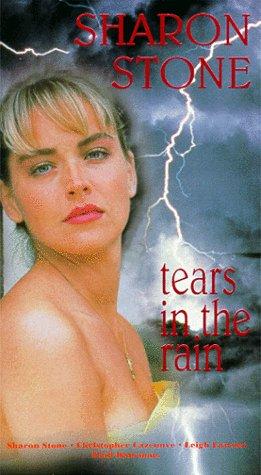
TEARS IN THE RAIN
UK, 1988, 100 minutes, Colour.
Sharon Stone, Christopher Cazenove, Anna Massey, Maurice Denham, Leigh Lawson.
Directed by Don Sharp.
Tears in the Rain is one of the Harlequin romances made during the 80s by Yorkshire television. The production values were extraordinarily high, even lavish. The directors were prominent British directors for example Don Sharp for this film. The material is fairly perdictable and designed for tear jerking responses. They are highly emotional.
In the series, the heroine was usually a glamorous American. The here was a titled Englishman. The settings are the Continent and England. Money is no object - and the characters often have a predilection for training racehorses as well as succeeding in big business. They always have country estates. Sharon Stone (Total Recall, King Soloman's Mines) is the glamorous American heroine. Christopher Cazenove (Heat and Dust, Three Men and a Little Lady) is the romantic hero. The supporting cast includes Anna Massey, Maurice Denham and Paul Daneman as well as Leigh Lawson as a very anglofile Arab. The film pre-supposes the very conventially, romantic dream values of marriage, money and title, happy ever after.
1. An enjoyable romance? The Harlequin romance style - for the widest of popular audience, the "Womens" audience? The emotional response?
2. The title and its evication?
3. Introduction values: English settings, London, country estates? The world of wealth? The romantic score?
4. Casey, her presence in England, walking in the rain, scaling the wall, the encounter with Michael, her angry response? Her mission to give the letter to Lord Braydon? The friendship with Michael, his seeking her out in the hotel? Dining together? The meeting with his Arab friend? Information about Lord Bridon? Going to London, approaching his office, his hostile and accusation of blackmail? Her trying to work out what to do? Michael seeking her out, social and falling in love, the sexual encounter? The rivalry from the Arab friend? The hostility of Itibard at the banquet? Her being ousted? Michael's anger? Their meeting, discussions, her talking with her mother's friends? Piecing together the story of her mother and Richard? The friend finding out the information about her from America? Lord Braydon and the reading of the letter, his relenting? Lady Emily and her telling Casey the truth about his mother, Michael being her son? The suggestions of unwitting incest? Her grief? going back to America? The Arab friend and his looking at the documents, the discovery of her being adopted - and audiences guessing that this would be the ease for the happy ending? The final confrontation and the happy ending, wealth and a title as well?
5. Michael, English lord, the encounter with Cawey, infatuated with her, seeking her out, the meals, the outings? His friend? Clashes with his father? The outburst against Casey at the dinner? His own anger? Exploring the truth with her? The story of his mother? The romance, the seeming frustration of the romance? the truth about his relationship with his father, Jessie as his mother? The happy ending?
6. The friend, attracted to Casey, in the confidence of Lord Braydon? Finding the information? Suspicious, supportive, finding out the key element of Casey's being adopted?
7. Richard, his strained relationsip with Emily? The businessman? His relationship with his son? His anger towards Casey, the rejection of the letter, the outburst? The importance of the flashbacks and building up the story? The Air Force, meeting Jessie, her singing, the romance? Her husband killed in action? The outings, the bombing raids, the proposal? Her sudden disappearance? Emily and the flashbacks and the truth: the information about Frank being alive, the note from Richard, the message from Jessie and Emily cruelly not giving them to either? The truth about Jessie's return to america, care for her husband, the letter? The final truth about the adoption?
8. Emily, friendship, ambition for Richard, not giving the messages, her cruelty, cruelty to Casey?
9. The supporting characters - at Braydon Hall, the Arab chauffeur and his kindliness?
10. Themes of romance, wartime romances and perpetual fidelity, interventions, the finding out of truth after decades? Suggestion of impossible love - with the incest suggestions, yet the happy ending for this kind of Harlequin romance?
Published in Movie Reviews
Published in
Movie Reviews
Tagged under
Saturday, 18 September 2021 19:44
Teddy Kennedy Jnr Story, The
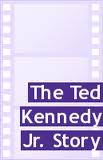
THE TEDDY KENNEDY JNR STORY
US, 1986, 90 minutes, Colour.
Craig T. Nelson, Susan Blakely, Kimber Shoop.
Directed by Delbert Mann.
The Teddy Kennedy Jnr Story is an interesting and entertaining telemovie, based on the real experience of Ted Kennedy Jnr and his leg cancer and the amputation as well as his rehabilitation. The film gives a portrait of Senator Edward Kennedy - fairly sanitized for the popular audience but alluding to the tragedies and flaws in the family. The film is more direct about Joan Kennedy's alcoholism and her attempts to go through cures. This is background, however, for the story of the young boy faced with cancer and amputation and his attempts to literally to get on his feet again. The real Teddy Kennedy appears at the end of the film to make a plea to audiences for sympathy and understanding of people who are differently abled. Craig T Nelson is very good as Kennedy, Susan Blakely as Joan. Kimba Shoop is a credible Teddy Kennedy - and not unlike the real Kennedy who appears at the end. The film was directed by Delbert Mann, director of many telemovies as well as Oscar winner for Marty.
1. Interesting telemovie? For the wide audience? A true story? Another chapter in the Kennedy's story?
2. The Boston and Washington backgrounds? Virginia? The world of politics, the rich Kennedy family? Hospitals? Ireland? musical score?
3. The background of the Kennedys and audience knowledge of them, response to them? Edward Kennedy as the youngest of the brothers, as Senator, his political career, the mishaps? Joan Kennedy and the marriage, out of place in the Kennedy clan, her alcoholism and its reasons? Their family? How interesting the portrait of Senator Kennedy behind the scenes, as a man, father, husband? AS a politician? Joan Kennedy and her personality, the alcoholism, going to Switzerland? Her pessimistic response to her son's cancer? Her supporting her son? The glimpse of the other children in the family and family scenes?
4. Teddy Kennedy Jnr, his age, in the Kennedy family? School, football training and ambitions? Cousins and friends?? Ordinary young boy? The injuries, the doctors, the X-rays? Hospital? Taking of the TV away? The puzzle? His father explaining the reality to him - the hardest thing he ever did? The parents support? The leak, going to Ireland, being ill, the chemotherapy? His wanting to rejoin the group? Back at school? His courage?
5, The background of doctors and hospitals, meetings, discussions, communications to parents of the truth? Operations and treatment?
6. The making of the artificial limb? The use of such a limb? Technological improvements for people differently abled because of amputations?
7. The background of the Kennedy clan, Senators, politics? The media and photographs and interviews. Entertaining? Informative about cancer and treatment? Inspiring? The final scenes with the real Ted Kennedy.
Published in Movie Reviews
Published in
Movie Reviews
Tagged under
Saturday, 18 September 2021 19:44
Three Amigos
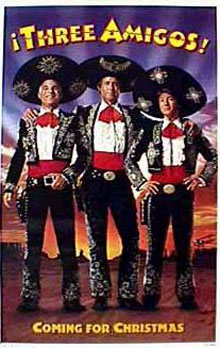
THREE AMIGOS
US, 1986, 104 minutes, Colour.
Steve Martin, Chevy Chase, Martin Short.
Directed by John Landis.
Three Amigos is an amusing spoof of westerns and the silent movies and their stars. It was co-written by star Steve Martin and musical composer Randy Newman (responsible for the enjoyably spoof songs throughout the movie). It is a star vehicle for Chevy Chase, Martin and Martin Short. They each bring their own particular zany style to the comedy. Joe Mantgena is the Hollywood producer. The film takes its cue from the stars of the western, singing stars like Gene Autry and the contrast between their screen image and the reality. The three amigos are particularly inept - but, of course, a situation makes demands on them and they become their better selves. The situation is reminiscent of that in the Seven Samurai (and the Magnificent Seven) and films like The Wild Bunch. The film is directed by John Landis, a veteran of many amusing spoofs ranging from An American Werewolf in London to Trading Places, Spies Like Us and Coming to America.
9. Entertaining American style comedy? The stars and their style?
10. Hollywood in the early days of the movies, the Mexican locations? The artificial sounds stages for a beautiful, artificial west?
11. The spoof of silent stars and their styles, dialogue, stunts? The romantic songs, spoofing the trivial?
12. The silent stars, their style, stilted acting, cliche dialogue? The tribute to the silent movies? The effect on audiences - the Mexicans, the German pilot and his practising to shoot like Ned?
13. Hollywood, the movies, arguments about money, producers and their staff, tough, the sacking? The telegram - the decision to go to Mexico, to perform, the town, the hotel and drinking the tequila, singing the buttercup song? the needs of the villagers and their misunderstanding? The echoes of the Magnificent Seven?
14. The German pilot, German contact with Mexican bandits at the time, the shoot-out in the hotel? The reaction of the Mexicans - macho, slinging off, shot? The response to the three Amigos - and joining in the buttercup song? The Germans arriving and more shooting?
7. The villain and his henchman, tough, the attack on the village, the confrontation with the amigos and their routine, real blood, their weeping and leaving, the villain spurning them? The villagers shutting their door? The decision to take a stand and be heroic? caught, Ned, falling on the table? The pilot and the shootout? The escape - the plane? Going back to the village, sewing the costumes, everybody dressed as the three amigos - and with the chief making his joke of shooting Dusty in the foot at the end?
15. Dusty and Chevy Chases' deadpan ignorant style? Lucky as the leader? Ned as ingenuous? The planning how to use their money - the children's foundation etc.? But giving the money back according to the script at the end? the different comic styles, comedy, singing?
16. The Mexicans, Carmen as the heroine, the young boy, the people in the village? The bandit, his rhetoric, meanings of words like plethora, his birthday? The macho men in the bar?
17. The picture of Hollywood, the producers and their ignorance, domination?
18. The Germans, the Germanic pilot, his henchman, the hunt?
19. Visual jokes, verbal, slapstick and deadpan?
Published in Movie Reviews
Published in
Movie Reviews
Tagged under
Saturday, 18 September 2021 19:44
Three Wishes of Billy Grier, The
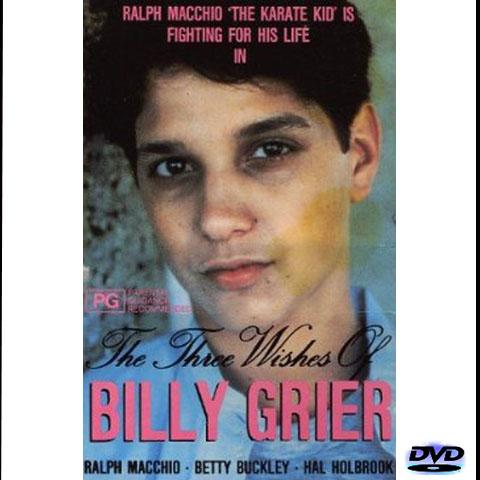
THE THREE WISHES OF BILLY GRIER
US, 1984, 100 minutes, Colour.
Ralph Macchio, Hal Holbrook, Viveca Lindfors, Season Hubley, Betty Buckley, Jeffrey Tambor, Lawrence Pressman, Conchata Ferrell, Laura Dern, Ed Lauter.
Directed by Corey Blechman.
The Three Wishes of Billy Grier is a star vehicle for Ralph Macchio (The Karate Kid). He portrays a teenager who has a rare disease causing premature ageing. The film is in the vein of the movie illness of the week, but treats its subject sympathetically and gives the audience some insight.
The film shows the effect of the illness on Billy, his wanting to see his father who abandoned the family many years earlier, his encounter with the sympathetic dancer, would-be beautician, played by Seasan Hubly. Betty Buckley portrays his anguished mother. Viveca Lindfors and Hal Holbrook are part of the supporting cast. The film was written and directed by Corey Blechman and, while not based on an actual story, is based on research.
1. Impact of the telemovie? For the home audience? For understanding an illness? Theconsequences on the victim? Coping with the illness? Treatment?
2. The setting of the town, the hospital, the bus, the American cities? The world of Billy Grier? Audiences identifying with him and his world?
3. The title, the focus on Billy, his life and death?
4. The framework of the film: seeing Billy as aged, the family holiday home, with the children? The premature old man? The flashbacks and his remembering his life? Coming back to the shells and the children at the end and the pathos of his death?
5. Billy as a ordinary young teenager, sport, relationship with his friends? His love for Chrissy and their encounters, sexual bravado, intimacy death? friends, teachers, the final phone call and his having to leave her? His relationship with his mother, clashes and her tension, helping her - and the memories of his absent father? His love for his grandfather, the crotchety old man, the friendly neighbour? His illness, going to the doctor, the further tests? His mother's reaction? The battery of tests, the interviews? His understanding his condition? Trying to cope, the decision to run away to meet his father, meeting Phyllis on the bus, talking with her, the meal, at home, his talk about himself, about sexuality ? His playing his musical instrument, in the restaurant? His dream of being a musician? The friendship with Phyllis, trying to help her with the loan? The intimate sequences? His going to find his father, in the bar, approached by the woman, being sent away? Finding his father, the response of the dog, his father not recognizing him? His grandfather coming to see him, persuading to come home?
6. The pathos of the illness, its rarity, its effect? On the sufferer? On family and friends? His mother's inability to cope?
7. Nancy, love for her son, abandoned by her husband? Her proneness to being in crisis, emotional? Her friehdship with Frank, his visits, support? Love for her son, clashes with him? Her inability to accept the decision of the doctors, walking out, fainting? Trying to care for her son? His leaving, her anguish? Reunited?
8. His grandfather, cranky old man, love for Billy, the friendship with the woman down the hall, borrowing sugar, going shopping? Together? persuading Billy to come home?
9. Phyllis, on the bus, her story, hopes, wanting the loan? At home, her tough attitude? Not wanting sexual encounter? Growing friendship, intimacy? The car, driving? Trying to get the loan? Billy affecting her life? Bringing qualities out of her?
10. The doctors, concern, tests? Treating Billy? Offering him hell? His return to the institution, their interviewing him, learning about the disease from him?
11. His father, walking out, glimpsed by Billy - but no contact?
12. The use of this kind of telemovie to dramatise an illness, help audiences to be informed, appreciate the effect on the victims, the repercussions for family and friends? For doctors and research?
Published in Movie Reviews
Published in
Movie Reviews
Tagged under
Saturday, 18 September 2021 19:44
To Kill a Priest
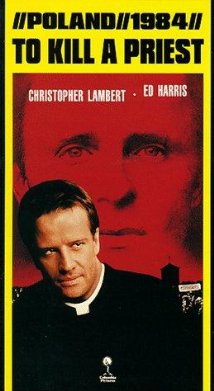
TO KILL A PRIEST
US, France, 1988, 115 minutes, Colour.
Christopher Lambert, Ed Harris, Joss Ackland, Tim Roth, Timothy Spall, Pete Postlethwaite, Cherie Lunghi, Joanna Whaley, David Suchet.
Directed by Agnieszka Holland.
To Kill a Priest was directed by Agnieszka Holland who also originated the story and co-wrote the screenplay. Holland is a Polish director who spent some of the 80s in exile.
This film is a pro-Solidarity film, creating the atmosphere of the Solidarity movement at the beginning of the 80s. It also focuses on the harshness of the secret police and the bureaucracy wanting to crush Solidarity. However, the screenplay is based loosely on the story of the Polish chaplain, Fr. Jerzy Popieluszko who was murdered by the secret police in 1984. The film has an international cast, mainly British. French Christophe Lambert (Greystoke, Subway, Highlander) is the priest. Ed Harris (Places in the Heart, Alamo Bay, Walker) is the police officer who kills the priest. Joss Ackland is a communist official, David Suchet a very compromising bishop, Joanne Whalley a woman who is infatuated with the priest, Cherie Lunghi is Ed Harris's wife.
The audience knows that the priest will die at the end. This detracts somewhat from the suspense and the drama. However, the film is very earnest in its presentation of the priest and the charismatic nature of the solidarity leaders. It also offers some drama in the ambiguity of the policeman, his fascination with the priest, even warning him not to go to his death - yet a fanaticism of having been trained as a child to be a loyal member of the Communist Party and a great sense of duty and the use of any means for doing his job. Tim Roth (Meantime, The Cook, The Thief, His Wife and her Lover) is very good as the Judas figure. The film is a testimoney to the changes in Poland and the collapse of the communist system in the 80s. Within three years of the making of this film, Lec Walensa was elected President of Poland.
1. Interesting and entertaining drama? Picture of the Solidarity movement of the 80s? Polish life and politics? The portrait of a priest martyr and the pursuit by the police?
2. The Warsaw background, Solidarity revolution of the early 80s? Life in Poland in the 80s, its ordinariness and comforts, its harsh regime? The special effects for the murdering of the priest? The musical score?
3. The title and audience expectations, based on the true story of Fr. Jerzy? Audience familarity with this or not? Audience familarity with Solidarity?
4. The history of post-war Poland, Communist regimes and opression? Brainwashing of the Polish people, the work of officials and the secret police? The Solidarity movement, the leadership of Walensa? The revolution, the meetings?
5. The background of the church, persecuted yet surviving? Its influence on Poland? John Paul II? The role of the church in preserving its life, in compromise with the government for freedoms? The role of martyrs? The dramatic aftermath and the changes in Europe in 1989, Solidarity ruling in 1990?
6. The portrait of the priest, seeing him with people, introducing him in the gym, boxing, discussions with Jusef? At home? His sermons, the crowds, his being able to rouse them? On their side? Hymns? Signs of victory? His accepting Felix? trusting him, allowing him in the house? His being arrested and blindfolded? His having to give the last rites to the young man to be executed? The arrest for harbouring Felix? In prison, being let go? The discussions with the bishop, being sent to Rome? His explanation that he was on the people's side, that they understood this? His friendship with Jusef and his wife? The infatuation of the girl, its affect on him, his resistance, her rejection of compassion? His friendship with Jusef and support, the warning not to go to the Mass? His reaction to the phone call? The sermon to the priests and seminarians? The pursuit in the car, Jusef telling the joke? Jusef taken, the policeman bashing the priest? in the boot of the car, at the side of the river, bashed and his cries for help? Being thrown into the dam? The final images and his being considered a saint? A contemporary martyr, a strong human being, compassion, courage of convictions.
7. The portrait of the policeman, earnest in his work, comrades? The family man? the contrast with his brutality against Solidarity supporters? The use of violence? Infiltrating groups? His love for his son, the warm family scenes, the clashes with his wife? Her suspicions, the reconciliation? Getting the dog? The death of the dog? Being seen at work, yet going to the church, joining in the prayers, being videod? His defence of himself? His attack on the priest? The build-up to the priest's surveillance, Felix's, infiltration, the arrest, his having to be released because of the amnesty and the officials? The official friendly with him, taking him to the bridge game, permission being given to get rid of the priest? His work with Felix and the fat young man? Their plans, their training, shooting? His warning on the phone for the priest not to go? Motives for this? His going into the church, looking at the priest, being asked to leave? The pursuit, the unexpected violence of his bashing of the priest, killing him, putting him in the dam? Going home to his wife, love-making? The official reaction, his having to defend himself? The officials washing their hands of him? The official giving him the message and burning it, the soot on his hands? The policeman spitting at him? His going to the trial, his defence of himself, the sentence that he received?
8. Felix, his background, in Solidarity, changing attitudes, the insinuations about his homosexuality? His going to the priest and pretending to want refuge, plausible? His being trusted? The arrest and his achieving his goal? His working with the policeman, looking at the slides, his eagerness to be part of the plan to kill him? His participation, his being named? The fat man, being involved, his fears and the brutality, saying Felix's name? The blood on his face? The aftermath for these murderers?
9. Jusef and his friendship with the priest, at communion, his girlfriend and her wanting to be baptised, the marriage? His support of the priest, the girl, and her infatuation, seductive, yet not wanting compassion, backing off? Taking him in the car to the wedding? Her grief at his death? Jusef and his support, driving the priest, telling the joke, bound and gagged, hurling himself out of the car, getting the police to search for the priest? His doubts and loss of faith at the end?
10. The Communist official, within the system, his regard for the policeman, interrogating him about the video? Taking him to the bridge game, support for the killing? The phone call and the high officials disowning the situation?
11. The policeman's son and wife, their being terrorised, fear of the Solidarity people? Hysterical behaviour at home? The policeman drawing the hanged people on the door? The wife and the birthday party and the gift of the tie, her husband's reaction? Her having to leave home with the boy, changed names?
12. How accurate a portrait of Polish life in the 80s? The film helping audiences to understand the communist regime, the need for change, Solidarity and its political ambitions, the repressive reaction of the secret police, the role of the church, leadership and martyrdom?
Published in Movie Reviews
Published in
Movie Reviews
Tagged under
Saturday, 18 September 2021 19:44
Tovarich
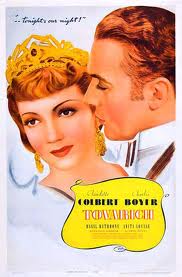
TOVARICH
US, 1937, 98 minutes, Black and white.
Claudette Colbert, Charles Boyer, Basil Rathbone, Anita Louise, Melville Cooper, Isabel Jeans.
Directed by Anatole Litvak.
Tovarich is a popular comedy from the late 1930s, something of a classic comedy. It focuses on Russian emigres in Paris (echoes of Ninotchka, which was to be filmed in the following years).
Claudette Colbert and Charles Bover enjoy themselves as a Russian prince and princess who are reduced to poverty in Paris, in the 30s, gain employment from a banking family, confront their former persecutor and torturer - in the form of Basil Rathbone. The film is amusing and light - though it may have had stronger impact in tems of realism within 20s years of the Russian Revolution with so many of the aristocracy moving towards France and other countries of exile. The direction is by Anotole Litvak, a popular director of the time with such films as The Sisters, and All That Heaven Allows.
1. Popular and classic comedy of the 30s? Appeal now?
2. Black and white photography, studio sets? Musical Score?
3. The title, the 30s, Russian comrades, the Soviet Union, the Russian Revolution and White Russian exiles?
4. The stars, their popularity and style, vivacity? Michael and Tina in Paris in the 30s, poor, their love for each other, the memories of the past and their aristocracy? Lack of money, Tina stealing in the market place, pursued by the police and the children? The truth about the paying of the bills for Russian aristrocracy? Their poor situation, the banker visiting them? Michael and his cheque for billions of dollars given to him by the Tsar?
5. Paris in the 30s, the refugees? Money and debt? The bankers? The aristrocrats hiring theriselves out as servants? The contrast with the Paris elite?
6. Going for the job, the interview, pleading their cause? The family and its giddy snobbery? The hairdressers and the mother and her behaviour, their leaving? Emergencies? Reliance on Tina and Michael? Their children, their self-centredness, their willfulness? Interest in Tina and Michael, attached to them? The servant role, offering good service, reliable?
7. The growing infatuation of the youngsters? The preparation for the dinner, getting the host and hostess ready? The guests and their arrival? The discovery of the truth about Tina? The crisis for the host and hostess? Impeccable behaviour during the evening?
8. The meal? The tension with the servants? The international guests and their response the Germans and their language, the English countess, the Spanish gigolo? The commisar and his going to the kitchen, his appeal for the money to keep parts of Russia for the Union? Tina and her change of heart?
9. The cheque, the kitchen scene and the interaction? Tina's decision? Michael signing the cheque?
10. The family and the dilemma, having nobily remain, the bargain?
11. Tina and Michael dressed as aristrocracy , going to the party - and their future? The light touch about the clash of cultures in the context of the Russian Revolution and its aftermath? for servants, pleading for them to stay?
Published in Movie Reviews
Published in
Movie Reviews
Tagged under